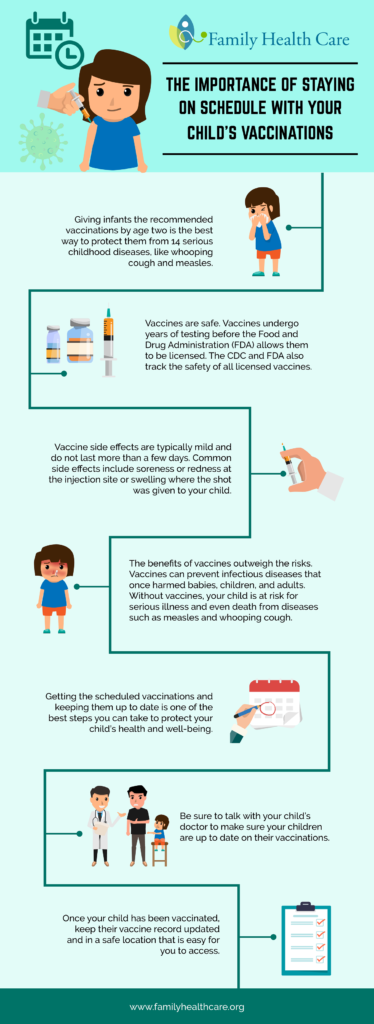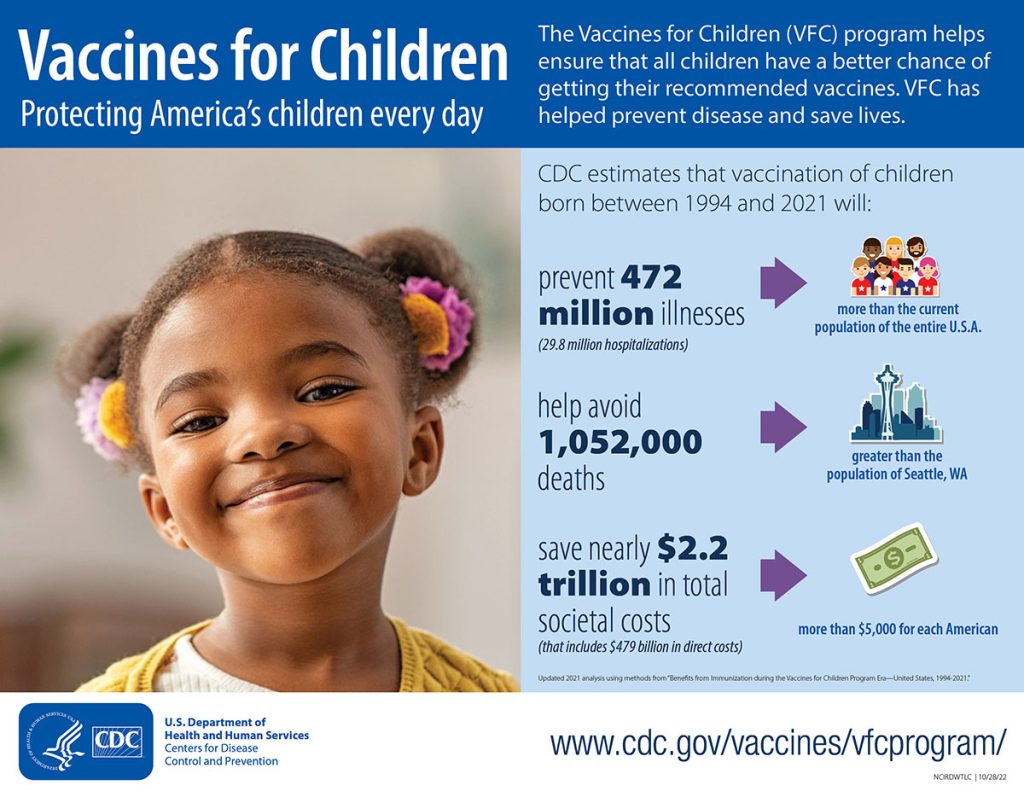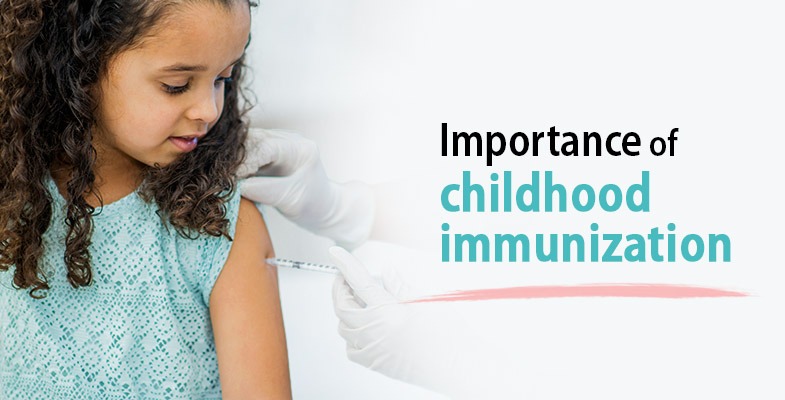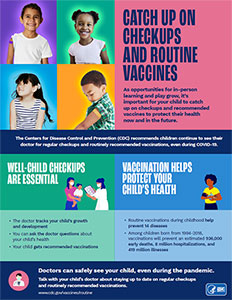Childhood immunizations are crucial in protecting children from potentially life-threatening diseases. By administering vaccines, we can boost their immune systems and prevent the spread of illnesses. These immunizations not only shield individual children from harm, but also help to safeguard the overall health and well-being of the community. Find out more about the importance of childhood immunizations and the long-lasting benefits they provide.

This image is property of www.familyhealthcare.org.
1. Protecting against serious diseases
1.1 Preventing illnesses like polio and measles
Childhood immunizations play a crucial role in preventing serious diseases such as polio and measles. These diseases can have devastating and long-term effects on individuals and communities. By ensuring that children receive timely vaccinations, the risk of contracting these illnesses is significantly reduced. Immunizations have been proven to be highly effective in preventing the transmission and spread of polio and measles, thereby safeguarding individuals from potential complications and even death.
1.2 Reducing the risk of life-threatening complications
One of the key benefits of childhood immunizations is the reduction in the risk of life-threatening complications. Vaccines are specifically designed to stimulate an immune response against certain diseases, enabling the body to effectively fight off infections. By being vaccinated, children are protected from developing severe complications that can arise from these diseases. For example, the measles vaccine can prevent complications such as pneumonia, encephalitis, and even death. Immunizations are a critical tool in ensuring the well-being and safety of children.
1.3 Eliminating the spread of infectious diseases
Childhood immunizations are instrumental in eliminating the spread of infectious diseases within communities. When a significant portion of the population is vaccinated against a specific disease, a concept known as “herd immunity” is achieved. This means that even those who are unable to be vaccinated, such as infants or individuals with weakened immune systems, are protected because the disease cannot easily spread within the community. By ensuring widespread vaccination, we can effectively eradicate certain diseases, preventing their resurgence and ensuring the overall health and safety of the population.
2. Building immunity
2.1 Teaching the immune system to recognize and fight infections
Childhood immunizations play a vital role in teaching the immune system to recognize and fight infections. Vaccines contain weakened or inactive components of a specific disease-causing agent. When introduced into the body, these components stimulate the immune system to produce an immune response. This response involves the production of antibodies and memory cells that recognize and target the specific disease-causing agent. By “training” the immune system in this way, vaccines enable the body to mount a swift and effective defense when confronted with the actual disease-causing agent, thereby providing protection against future infections.
2.2 Developing long-term protection against specific diseases
Another important aspect of childhood immunizations is the development of long-term protection against specific diseases. Vaccines are strategically designed to stimulate a durable immune response, enabling the body to maintain immunity over an extended period. This long-term protection is essential as it helps prevent individuals from contracting diseases later in life when they may be more susceptible to severe complications. By ensuring that children receive all recommended vaccinations, we can provide them with a solid foundation of immunity and improve their lifelong health outcomes.

This image is property of vaccinateyourfamily.org.
3. Ensuring public health
3.1 Achieving herd immunity
Childhood immunizations are crucial for achieving herd immunity within a population. Herd immunity occurs when a significant proportion of the population is vaccinated against a particular disease, making it difficult for the disease to spread. This protection extends beyond the vaccinated individuals, as those who are unable to receive vaccinations, such as newborns or individuals with certain medical conditions, are also shielded from the disease. By ensuring high vaccination rates, we can collectively protect vulnerable members of society and prevent the occurrence and spread of infectious diseases.
3.2 Minimizing disease outbreaks
By maintaining high immunization rates in children, we can minimize the occurrence of disease outbreaks. Diseases that are preventable through vaccination, such as measles or whooping cough, require a susceptible population for transmission. When a significant portion of the population is vaccinated, the chances of an outbreak are significantly reduced. This not only protects those who have been vaccinated but also acts as a barrier against the introduction and spread of these diseases within communities. Childhood immunizations are a powerful tool in preventing disease outbreaks and promoting overall public health.
3.3 Reducing healthcare costs
Childhood immunizations play a vital role in reducing healthcare costs for individuals, families, and society as a whole. Preventable diseases can lead to significant healthcare expenses, including hospitalizations, medications, and long-term care. By ensuring that children receive their recommended vaccinations, we can greatly reduce the likelihood of these diseases occurring in the first place. This not only saves families from potential financial burdens but also eases the strain on healthcare systems. Immunizations are a cost-effective preventive measure that promotes long-term savings and improved overall health outcomes.
4. Preventing long-term complications
4.1 Averting potential complications such as blindness and paralysis
Childhood immunizations are essential in averting potential long-term complications associated with certain diseases. For example, the polio vaccine has played a significant role in preventing cases of paralysis and disability caused by poliovirus infection. Similarly, the measles vaccine has been instrumental in reducing the risk of complications such as pneumonia, encephalitis, and even death. By ensuring that children are vaccinated, we can protect them from the debilitating effects of these diseases and improve their overall quality of life.
4.2 Decreasing the risk of chronic diseases later in life
Childhood immunizations not only prevent immediate complications but also decrease the risk of chronic diseases later in life. Certain diseases that can be prevented through vaccination, such as hepatitis B or human papillomavirus (HPV), have been linked to an increased risk of developing chronic conditions, including liver cancer or cervical cancer, respectively. By vaccinating children against these diseases, we can reduce their lifetime risk of developing these chronic conditions and promote long-term health and well-being.

This image is property of www.piedmont.org.
5. Safeguarding vulnerable populations
5.1 Protecting infants who are too young to be vaccinated
Childhood immunizations play a pivotal role in safeguarding vulnerable populations, particularly infants who are too young to receive certain vaccines. Infants have immature immune systems and are highly susceptible to severe complications from vaccine-preventable diseases. By ensuring that adults and older children who interact with infants are vaccinated, we can create a protective barrier around these vulnerable individuals. This practice, known as “cocooning,” helps shield infants from potential infections and contributes to their overall health and well-being.
5.2 Immunizing individuals with weakened immune systems
Immunizations are crucial for immunocompromised individuals who have weakened immune systems. These individuals may be unable to mount an effective immune response to certain diseases. By vaccinating those around them, we can provide a layer of protection against infectious diseases that could be particularly dangerous for those with compromised immune systems. Immunizing individuals with weakened immune systems, whether due to a medical condition or medication, is an important step in ensuring their safety and reducing the risk of severe complications.
6. Meeting school and daycare requirements
6.1 Fulfilling mandatory immunization requirements for enrollment
Childhood immunizations are necessary for meeting mandatory immunization requirements for enrollment in schools and daycare centers. Educational institutions have policies in place to protect the health and well-being of all students, staff, and visitors. These policies often include requirements for certain vaccinations to prevent the spread of vaccine-preventable diseases within educational settings. By ensuring that children are up to date on their immunizations, parents can fulfill the necessary requirements and support a safe and healthy learning environment for all.
6.2 Preventing the spread of diseases within educational settings
Childhood immunizations serve as a crucial preventive measure in preventing the spread of diseases within educational settings. Schools and daycare centers can be ideal environments for the transmission of infectious diseases due to close contact between individuals. By requiring immunizations, educational institutions significantly reduce the risk of disease outbreaks and protect the health of their students, staff, and the surrounding community. Timely vaccinations not only protect individual children but also contribute to the overall well-being and safety of the educational environment.

This image is property of www.ivfspecialistkolkata.com.
7. Supporting global health initiatives
7.1 Contributing to worldwide efforts to eradicate preventable diseases
Childhood immunizations play an integral role in supporting global health initiatives aimed at eradicating preventable diseases. Organizations such as the World Health Organization (WHO) and UNICEF work tirelessly to promote vaccination programs worldwide, particularly in regions where diseases such as polio or measles are still prevalent. By ensuring that children receive their vaccines, we are actively contributing to these global efforts, helping to eliminate preventable diseases from every corner of the globe. Childhood immunizations are a powerful tool in achieving global health equity and improving the lives of countless individuals.
7.2 Promoting equitable access to vaccines
Childhood immunizations help promote equitable access to vaccines for all children, regardless of their socioeconomic background or geographical location. Vaccination programs aim to reach vulnerable populations in both developed and developing countries, ensuring that every child has the opportunity to receive life-saving vaccines. By supporting immunization efforts, we can help bridge gaps in healthcare access, promote social justice, and give every child a fair chance at a healthy and prosperous future.
8. Addressing vaccine misinformation
8.1 Countering the spread of misconceptions and falsehoods
Childhood immunizations play a crucial role in countering the spread of vaccine misinformation. Unfortunately, in recent years, there has been an increase in vaccine hesitancy fueled by misconceptions and falsehoods regarding the safety and efficacy of vaccines. By educating the public and providing accurate information about vaccines, we can dispel myths and promote evidence-based decision-making. Immunizations have been extensively studied, and their safety and effectiveness are well-established. It is essential to address vaccine misinformation and highlight the importance of childhood immunizations in protecting individual and public health.
8.2 Educating the public on the safety and efficacy of vaccines
Childhood immunizations offer an opportunity to educate the public on the safety and efficacy of vaccines. Vaccines undergo rigorous testing and are subject to rigorous regulatory processes to ensure their safety and effectiveness. By sharing this information with the public, we can build trust and confidence in vaccines. Educating parents, caregivers, and communities empowers individuals to make informed decisions regarding the health and well-being of their children. By promoting accurate and evidence-based information, we can foster a better understanding of vaccines and their critical role in preventing diseases and protecting public health.

This image is property of www.cdc.gov.
9. Enhancing overall population health
9.1 Reducing the burden of preventable diseases on society
Childhood immunizations have a significant impact on enhancing overall population health by reducing the burden of preventable diseases on society. Vaccines have been instrumental in the control and elimination of devastating diseases throughout history, such as smallpox. By preventing the occurrence and spread of diseases, childhood immunizations reduce the burden on healthcare systems, minimize healthcare costs, and improve overall societal well-being. Immunizations are a valuable investment in the health of our communities, ensuring a healthier and more prosperous future for all.
9.2 Improving overall well-being and quality of life
Childhood immunizations play a crucial role in improving overall well-being and the quality of life for individuals. By preventing the occurrence of vaccine-preventable diseases, children are protected from potential complications that can have long-term effects on their physical, emotional, and social well-being. Vaccinations allow children to grow, play, and thrive without the burden of preventable illnesses weighing them down. By safeguarding their health during their most vulnerable years, childhood immunizations pave the way for a brighter and healthier future.
10. Anticipating future outbreaks
10.1 Preparing for potential disease outbreaks and epidemics
Childhood immunizations are essential in anticipating and preparing for potential disease outbreaks and epidemics. Infectious diseases have the potential to spread rapidly within populations, leading to outbreaks and even epidemics if left uncontrolled. By ensuring that children receive their recommended vaccinations, we can proactively protect against the resurgence of certain diseases and prevent future outbreaks. Vaccinations serve as a proactive approach in public health, building a defense against potential threats and strengthening our ability to respond swiftly and effectively.
10.2 Maintaining vigilance against emerging infectious diseases
Childhood immunizations are vital in maintaining vigilance against emerging infectious diseases. Our world is constantly evolving, and new pathogens or variants of existing viruses can emerge at any time. By staying up to date on immunizations, we can be better prepared to combat potential outbreaks caused by emerging infectious diseases. Vaccines are adaptable and can be updated to target new strains or variants, ensuring that our immune systems remain equipped to fight against these evolving pathogens. Childhood immunizations enable us to stay one step ahead and maintain our defenses against emerging health threats.
In conclusion, childhood immunizations are of utmost importance for numerous reasons. They protect against serious diseases, decrease the risk of life-threatening complications, and eliminate the spread of infectious diseases. Immunizations help build immunity, ensure public health, prevent long-term complications, and safeguard vulnerable populations. They also aid in meeting school and daycare requirements, support global health initiatives, counter vaccine misinformation, enhance overall population health, and anticipate future outbreaks. By making sure that children receive their recommended vaccinations, we collectively contribute to a healthier, safer, and more resilient society. Childhood immunizations are a vital investment in the present and future well-being of our children and communities.
